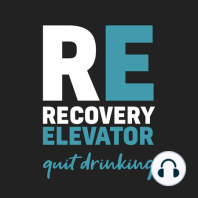43 min listen
RE 311: S is for Self Sabotage
ratings:
Length:
52 minutes
Released:
Feb 1, 2021
Format:
Podcast episode
Description
Emmy took her last drink on December 8, 2019. This is her story of living alcohol free (AF). Finding Your Better You – Odette’s weekly message. Odette spoke about a personal and very sensitive issue: she is an Adult Child of an Alcoholic. She took charge of her recovery but recently identified some behaviors and coping mechanisms she was hoping to skip over that are rooted in her early years growing up in an alcoholic home. Odette realized she had been stuck in a pattern of self-sabotage for years in many aspects of her life, some more dangerous than others. Self-sabotage showed up in her relationships with friends, at school, and with her husband. While Odette doesn’t like the label of being an adult child of an alcoholic, she has come to realize she can’t wish the consequences away. Pain in our families makes our emotional state a bit disheveled. We live waiting for the other shoe to drop. We were guarded and untrusting. This state became our normal: the feeling that something is wrong all of the time. Odette is focused on understanding the impact self-sabotage has on her behavior. She is practicing new behaviors. She is working on making small shifts – to see things differently. No matter how destructive our behavior has been in the past, we can experience new ways of being. [9:38] Odette introduces Emmy Emmy took her last drink on December 8, 2019. She is from Fort Worth, Texas, and she is 30 years old. Emmy is a recreational therapist who works with children and adults with various disabilities. She is single, no kids, and lives with her five-year-old dog Petey. She has fun participating in her recovery, getting to know who she is, and learning to become her own friend. [13:06] Can you give listeners some background on your history with drinking? Emmy said she started drinking around 16 or 17. She was at a friend’s house where somebody had brought over a bottle of alcohol mixed with Propel and thought it was cool. She remembers the first sip giving her this sort of warm feeling inside and thinking, ‘nothing bad can ever happen with this.’ She kept that routine going every weekend as a teenager. When she went to college, she found an excuse to drink every night, whether trivia night or intramural sports. She also worked in a restaurant and could drink behind the bar. Everybody was doing it, so it didn’t seem like a problem at the time. She graduated college and worked in a nursing home by day and a restaurant by night. She was working 50-60 hours a week, which gave her another excuse to drink because she worked so hard. [14:45] At this point, were you starting to question your relationship with alcohol, or were you thinking this is just what people do? Emmy said she knew as a teenager; it may become a problem in the future. She saw so many people doing the same thing and thought she would have to look at it later down the road. [15:28] Walk me through what happened afterward, how did that progress? Emmy went to grad school, which started drinking Round 2. She thought, I’m still in school, I can still live the same lifestyle. She graduated, got a Director job in a nursing home, with more responsibility. She was not surrounded by as many people who drank as she did. She began putting feelers out to different people, asking if she had a drinking problem. She was asking the wrong people, the people who drank as she did. She took that as validation she didn’t have a problem. She drank regularly for a few more years. She thought it was fun. There were many examples of alcoholism in her family. Problem drinkers have a problem every time. She believed she could maintain control and continue drinking. [17:35] Were you creating any rules for yourself, like moderation rules? Emmy said, don’t we all? She had rules about, don’t drink on Tuesdays and Wednesdays. She would break her rules all of the time, then double down on guilt and shame. Emmy moved to
Released:
Feb 1, 2021
Format:
Podcast episode
Titles in the series (100)
024: The Other Side Part 2 | Emma is the daughter of an alcoholic and is headed into her junior year of high school: Jim shares how surrendering is vital to his sobriety. by Recovery Elevator ?
